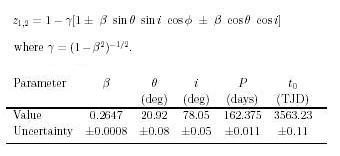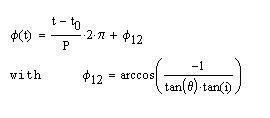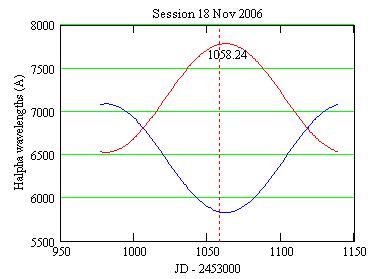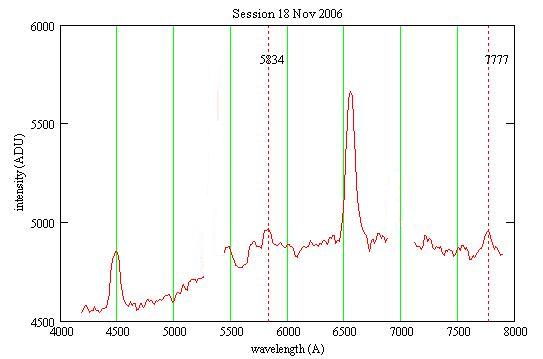SS433 very low resolution spectroscopy
Observed: 17, 23, 29 June, 23, 29 July, 22, 30 Aug, 20 Sept, 15 Oct, 14, 18 Nov 2006
M. Bonnardeau
20 Oct 2006
Updated 26 Jan 2007
Abstract
SS433 was observed with a 20cm telescope, a 100 groves/mm slitless transmission grating and a CCD camera. The famous Doppler shifted Halpha lines did not show up clearly with this amateur setup.
Introduction
SS433 (V1343 Aql) is a binary star with an accreting compact object (a neutron star or a black hole). The orbital period is 13 days. The compact object emits two jets at relativistic speeds. These jets are line emitting. The lines from the jet towards the Earth are blueshifted, and are redshifted for the other jet. Futhermore, the jets precess with a period of 162 days. For a review, see Margon (1984).
An ephemeris for the Doppler shifts needs only 5 parameters (Eikenberry et al (2001)):

t0 is the epoch of zero precessional phase. The phase is then:

Comparison of the ephemeris with measurements from Collins & Scher (2000):

Observations
The observations were carried out with a 203mm f/6.3 SC telescope, a
filter wheel and a ST7E SBIG camera (KAF401E camera). For the first observations,
a Jeulin 100groves/mm transmission grating was inserted between the filter
wheel (with a Clear filter) and the camera, at a distance of 33.8mm from
the CCD, owing to a Gerd Neumann filter holder and a homemade drawer.
For the observations since 30 Aug 2006 to 15 Oct 2006, a StarAnalyzer
100 grating was inserted in the filter wheel (the GN filter holder was
removed), at a distance of 49.3mm from the CCD (resolution: 18A/pixel).
For the 14 and 18 Nov 2006 observations, the StarAnalyzer is at 62.8mm
from the CCD (resolution: 14A/pixel).
An example of a spectrum:

Ephemeris: the redshift is 0.185 (Halpha at 7777) and the blueshift
is -0.111 (Halpha at 5834).

The very strong line is the Halpha 6563 line. The blueshifted Halpha
may show up at 5834 or this is HeI 5876.
The redshifted Halpha may show up at 7777.
All the spectra are HERE. These spectra are not corrected
for instrumental reponse or atmospheric effects. In most of them the
Doppler shifted Halpha line do not show up.
References
Collins G.W., Scher R.W. (2000) Proceedings of a meeting held at Case Western Reserve University, 2-3 May 1998. The data are available on-line from http://www-astro.physics.ox.ac.uk/~kmb/ss433/.
Eikenberry S.S., Cameron P.B., Fierce B.W., Kull D.M., Dror D.H., Houck J.R., Margon B. (2001) ApJ 561 1027 (ArXiv:astro-ph/0107296).
Margon B. (1984 Oct) Scientific American The Bizarre Spectrum of SS433 243 54.
Technical notes
Telescope and camera configuration.
Computer and software configuration.
|
|
|||
|
|||
|
|
|||
|
|
|||
|
|||
